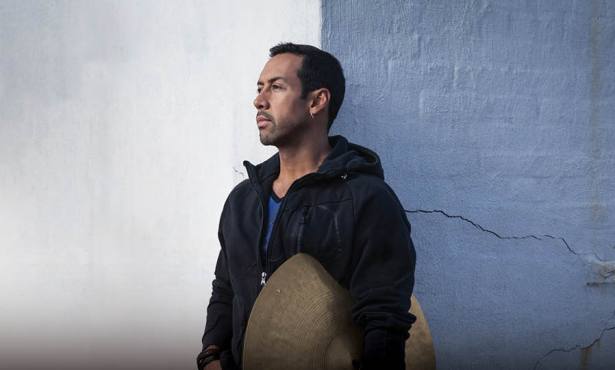Fiction with Novelty
Hot Off the Press
This month brought into the office a stack of novels all clad in striking, smartly designed covers with blurbs from literature’s coolest names. Much of this crop of edgy new fiction was penned by the young writers who may well become cool blurbers themselves in a decade or two, so even if you don’t read the books, do remember to drop the names.
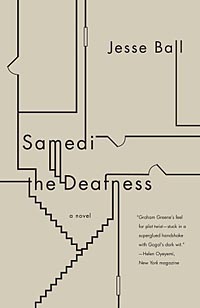
Samedi the Deafness by Jesse Ball
Samedi the Deafness is the first novel from the multitalented Jesse Ball-also a poet, visual artist, and self-described “pamphleteer”-and is easily the oddest of the bunch. Conveyed through cryptically titled miniature chapters, the book’s setting runs by different principles than ours, though it’s not always easy to tell exactly how different. The protagonist, one James Sim, is haunted by memories of a childhood pet: a talking owl that nobody else could see. Things get complicated when a dying man tells Sim of a vast, menacing conspiracy helmed by the “Samedi” of the title. Dedicating himself to finding out who this Samedi is and what’s being done, Sim winds up locked away in a “verisylum,” a sort of prison meant to rehabilitate liars, which is when the novel’s nightmare logic truly cranks up.
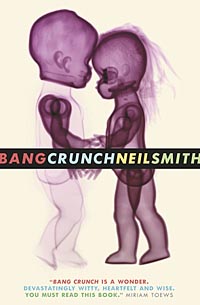
Bang Crunch by Neil Smith
Canadian writer Neil Smith wields a similarly reality-twisting sensibility in Bang Crunch, his first book. This collection of nine short stories serves up a little girl whose age tracks to the universe’s expansion, the dynamic between pink gloves and a foot without a body, a support group for victims of benign tumors-shades of Chuck Palahniuk (Fight Club)-and a husband’s ashes stored in a curling stone. Though no two of the volume’s stories have much in common, Bang Crunch is, taken as a whole, all about contrast: Subdued tales take their places next to wild ones, and within them all one finds resoundingly ordinary people dropped in highly unusual situations. The results rarely fail to fascinate.
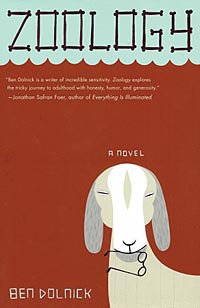
Zoology by Ben Dolnick
Moving on from the fantastic, Ben Dolnick’s Zoology fits snugly into the subgenre of “realistic fiction”; the book is reminiscent of nothing so much as a more mature version of the coming-of-age novels you enjoyed in third grade. Dropping out of college almost immediately after enrolling, Henry Elinsky settles back into his parents’ house, whiling away his days as a do-little assistant to his music teacher father. Yanked from complacency by an offer to live with his New York City-based med student brother, Henry transforms into something of a slacker Holden Caulfield, tending to the goats of the Central Park children’s zoo by day and roaming around, lost in his own neuroses, by night. By the end, Henry’s on his way to learning the standard suite of lessons about becoming a grown-up, but the fun’s all in the telling, specifically in the hero’s almost offhand way of doing so.
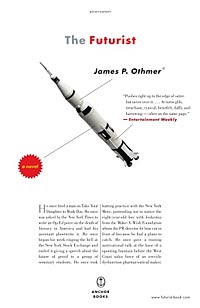
The Futurist by James P. Othmer
Though much more driven to succeed, Yates, the man at the center of James P. Othmer’s The Futurist, nevertheless looks at his life and dislikes what he sees. If you’ve ever wondered who exactly goes around popularizing buzzwords like “Web 2.0”, “synergy,” and “convergence,” Yates is just that: a hyperactive marketing consultant perpetually fighting to claim his place ahead of every trend. As it turns out, he can’t ride these waves of irrational exuberance forever. Fed up with it all, he unloads a Bulworth-style denouncement of his entire industry, leading to recruitment by a shadowy government organization. His mission: Fly around the world and find out why so much of it hates America. The Futurist is an amusing piece of satire, but you’d better read it soon: Teeming as it is with pop culture references of 2007, the novel is essentially equipped with its own self-destruct mechanism.
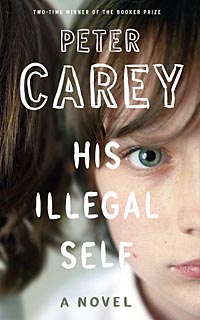
His Illegal Self by Peter Carey
The product of a brief union between two 1960s Harvard radicals, seven-year-old Che flees the middle-class cocoon in which his grandmother has contained him when his runaway mother Dialectic shows up unannounced. Thus begins His Illegal Self, the latest from two-time Booker-winner Peter Carey. Little Che’s journey proves unexpectedly harrowing as he and his mom travel outlaw-style all the way to a commune in the Australian jungle. For most kids his age, the world presents more questions than answers, but for Che, things are especially confusing. Who, for instance, is this strange woman who has claimed him as her own? What are the rules of the seedy, unfamiliar society in which she moves? Where’s Dad? Though life, unsurprisingly, doesn’t provide all the answers, Carey imagines Che’s experience vividly, in a manner all his own, one equally American and Australian.



